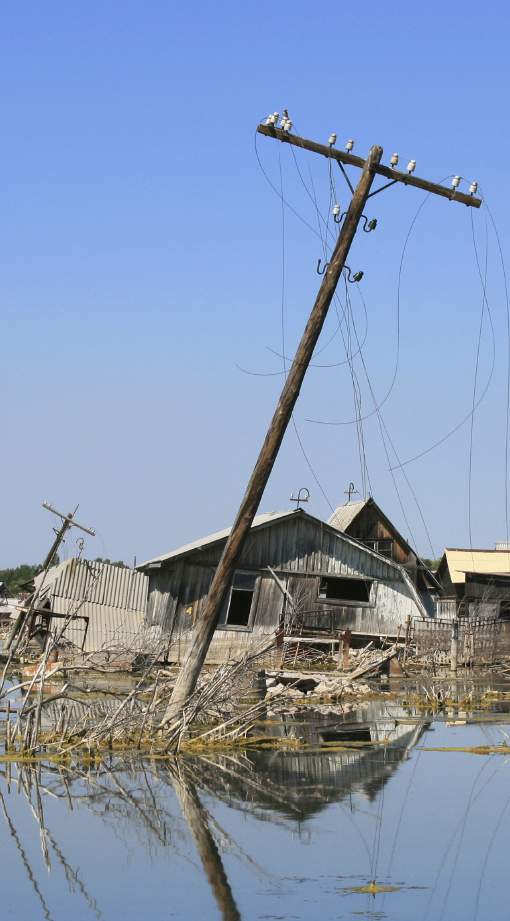Hurricanes
Hurricane Katrina struck swiftly and suddenly during the storm season of 2005. It was the sixth strongest hurricane ever recorded in the United States and caused the deaths of over 1,800 people. This devastating storm reminded the country of the powerful and devastating impact that nature can impose on modern society. The majority of the damage was done in the Greater New Orleans area. Massive floods engulfed parts of the city, forcing people from their homes into the flooded rivers that used to be lazy neighborhood streets. Over 26,000 people were forced into temporary residence at the local football stadium; the Superdome.
Crucial Steps to Prepare For a Hurricane Emergency
- Prepare a disaster protocol
- Setup multiple meet-up points with your family
- Communicate with walkie-talkies
- Keep important documents and cash, on hand at all times.

Hurricanes can quickly drive people from their homes, separating them from one another and causing extreme damage to structures. It is important to prepare for hurricanes from a tactical perspective. You should be aware of and prepared for the effects that the hurricane will have on both you and your surroundings. You should also prepare your family and loved ones for the events that are about to unfold. Be prepared for the flash flooding, strong winds, airborne
debris, and power outages that will occur.
Simple as it may seem, taking swimming lessons as a family at the local YMCA can be great preparation for a hurricane. Flash flooding can knock over homes in seconds and those who are familiar with how water can knock the human body around; will be able to race quickly and efficiently. You rarely hear about strong swimmers drowning or dying in floods resulting from hurricanes.
Even if you are a strong swimmer, however, it is never advised to try and cross a flooded path during a hurricane. Fast moving debris and unseen objects under the water can cause severe injury or death. Pre-set meeting points will allow friends and family members to know where everyone else will be, in case they are separated.
Having a destination or two, planned out in advance, will help keep you cool and focused under pressure. You will want to have a nearby, easily accessible meeting point. This can be a place everyone in your home knows about, such as, a child’s school, the local library, or a nearby park.
If the hurricane is so destructive that you must evacuate the immediate area, an alternate, more distant meeting point will be necessary. This location should also be known to everyone in your home and should be scouted out together; as a family. Preferably, this location should be far enough away so that you are outside the range of imminent harm. It should be close enough, however, that every family member will be able to get there on their own, if necessary. Sewing small pockets into shirts, pants and jacket linings is a great way to prepare for hurricanes, as well. During a hurricane, flooding will often destroy important documents. Making copies of identification cards and placing them into pre-sewn pockets along with some cash and a phone card is a great way to make sure everyone can get by if they are left alone.
This can prove to be a life-saving tactic with regards to kids and the elderly. Simply make copies of all the documents you may need and withdraw a couple of hundred dollars in $20 bills, from your checking account. Fold the documents and cash neatly in small squares and sew them into the inner linings of the clothing items mentioned. Have the clothing items at accessible location throughout your home, so that everyone can have easy access to them if there is a need to evacuate. This way, even if folks do not have time to pick up cell phones, wallets and original identification materials, they can still have access to their benefits.
The walkie-talkie is a way of hedging your bets against downed phone lines and wireless network failures. Hurricanes can disable power lines and take down cell phone towers. Keep in mind, however, that walkie-talkies do not have great range. They are far more useful in the early moments of a separation, than they are later on and over increasing distances. They can also be picked up by scanners, so even if you cannot communicate with your family, you can still call for help and expect someone to hear you. One final point about hurricanes; trust no one. We will repeat this point several times throughout this report as to hammer home the actual on-the-spot insanity of disaster situations.
You should always rely on yourself first and be wary of all persons, whether they are authority figures or not.
In the aftermath of Hurricane Katrina, multiple New Orleans police officers were prosecuted for crimes. A select group was even charged with the homicide of a mentally retarded man, whom they shot in the back. This comment is by no means a potshot at law enforcement officers. It is merely a reminder, that everyone is susceptible to erratic behavior during a disaster and that your trust cannot be blind.
Preparing yourself and your family to be quick, smart and efficient during a hurricane minimizes the potential of getting involved in volatile situations which can lead to conflict, violence or worse. Remember, the most important action in a hurricane is movement; you never want to be stationary. Always be moving towards your meeting point and/or away from the storm.

